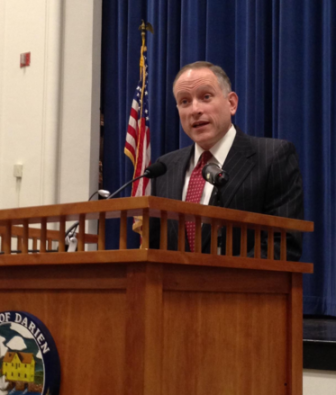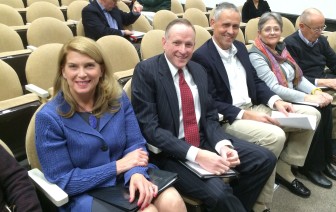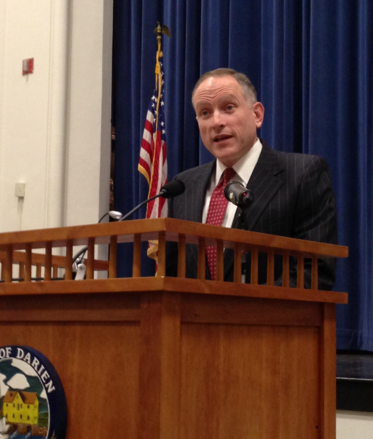The town’s five-year forecast for budget and financial planning includes a preliminary 3.5 percent tax increase for the upcoming fiscal year, Board of Finance Chair Jon Zagrodzky said in his 2015 “State of the Town” address.
“The forecast also includes preliminary spending increases for next year, which show 3.6 percent for the Town, 2.2 percent for debt service and 4.4 percent for the Board of Education, for a mill rate increase of 3.5 percent,” Zagrodzky said.
“These are all placeholders at the moment, as we have not begun our budget process, which by the way we hope to streamline and coordinate even further than we’ve done recently. But the increase overall certainly looks to be higher than last year [which was 2.3 percent].”
____________
FULL TEXT: ZAGRODZKY’S SPEECH
Here’s the text of Zagrodzky’s speech, which he gave Monday, as prepared (subheadings and slight editorial style changes have been made here by Darienite.com without changing any words):

Jon Zadgrodsky, chair of the Board of Finance, delivering his 2015 “State of the Town” address to the Representative Town Meeting (photo by Jim Cameron)
Good evening. My name is Jon Zagrodzky, and I’m the new chairman of the Board of Finance. I’m glad to have the opportunity tonight to offer a few perspectives relevant to the town’s finances.
Gratitude
Before doing this, however, I wanted to recognize a few individuals:
* First, congratulations to Kate Buch, who was recently promoted from Director of Finance to Town Administrator. Words can’t describe how grateful I am to Kate for her work during the years I’ve been on the Board. She is the complete professional – dedicated, highly experienced, extremely competent. I’d also like to welcome Jennifer Charneski, our new Director of Finance. She was very impressive during the interview process, and we’re looking forward to working with her.
_________
STATE OF THE TOWN SPEECHES: Full texts and descriptions on Darienite.com:
- Expect to Get More Housing, Retail Options, Says Stevenson in ‘State of Town’ Address
- Board of Ed Chairman’s State of Town Speech: Schools Will Need More Space
- Planning & Zoning Chair: Decisions on New Housing, ‘Unprecedented’ Commercial Development Coming in 2016
_________
* Second, congratulations to Jim Palen, newly elected to the Board of Finance. He was a long-time member of the RTM, and chair of F&B, so I know he’s going to make a fine addition to our Board. Jim, thanks for signing up. I’m sure you’d still rather be chairing the RTC, so I appreciate making the sacrifice to join our Board!
* Finally, I’d like to personally thank our former chairman, Liz Mao. The Darien Times is not known for having headlines in the spirit of the New York Post, but they came close when after she took on the role five years ago, they announced her as Chairman Mao. Anyway, I can tell you that Liz worked tirelessly in this job, often behind the scenes, on all kinds of issues, many of them complicated or contentious. She’s terrific, and I sincerely hope she will find another way to continue serving the town.
The Past Year
Let me start off with a couple of comments about last year. It was a tough year for taxes – we had budgeted a mill rate increase of 5.8 percent, which was really high.
Fortunately, we ended the year on June 30th with better-than-expected results. Tax collections were higher, driven in part by the aggressive efforts of Kathy Larkins, our tax collector, who was able to bring in nearly $1.6 million in uncollected taxes, interest and liens from prior years.

Town officials giving “State of the Town” addresses. From left: First Selectman Jayme Stevenson, Finance Board Chairman Jon Zagrodsky, Board of Education Chair Michael Harman and Planning & Zoning Commission Chair Susan Cameron
This was offset by a $146,000 reduction in our education cost sharing grant, which is what the State decided to deduct as a result of the problems with Special Education excess cost reimbursements.
On the expense side, costs were lower than expected by about $850,000, so in all, fiscal year 2015 ended up much better than we had feared.
Our current fiscal year started off on a good note, with a mill rate increase of just 2.3 percent. Contributing factors included lower debt service, which was the result of our continued efforts to refinance debt at lower rates. Actually, we’ve refinanced nearly $64 million over the last five years, with a savings net present value of nearly $5.5 million. This has all been great, but unfortunately, the well may be dry now – nearly all of our debt is low cost, which means there aren’t many more such savings opportunities.
As for the budget overall, it remains on track this year. We’re not seeing any materially adverse trends, although the potential for higher legal and education expenses is always out there.
Pensions
I did want to highlight one change we made this year regarding pensions. In addition to my Board of Finance role, I also serve on the town and police pension boards.
Many of you know that a key driver of the pension underfunding crisis in the United States is that many pensions have an unrealistically high rate of return assumption on their investments, which means that less can be contributed out of current spending to support future pension liabilities. A common return assumption is 7.5 percent, which is what we used until recently.
The pension boards undertook an effort with outside experts to review all this. Based on their professional recommendations, we reduced our return assumption to 6.5 percent. This change, along with other updates, will help ensure that we fund our pension obligations in the most prudent manner possible.
Rest assured that our pension assets remain well-managed, with no investments in volatile emerging markets or risky alternatives like hedge funds. In addition, we never short the recommended annual contributions, as many towns under financial pressure have done, so our funding levels remain healthy.
The Town’s Five-Year Finance and Budget Forecast
I did want to talk briefly about the five-year forecast, which has been distributed to you. In terms of major capital expenditures, this forecast includes about $9 million for school expansions and $4 million for the Town garage.
But it does not include other prospective projects, like plans for Weed Beach following the Short Lane acquisition or a renovation of Pear Tree Point Beach, both of which I understand the Parks and Recreation Commission is considering. Nor does it contemplate some of the broader school facility expansion that Michael Harman just mentioned.
The good news is that our debt is dropping – it’s about $70 million now, but we’re looking at $35 million in five years. So, we’ll have the debt capacity we need to support these projects.
The forecast also includes preliminary spending increases for next year, which show 3.6 percent for the Town, 2.2 percent for debt service and 4.4 percent for the Board of Education, for a mill rate increase of 3.5 percent. These are all placeholders at the moment, as we have not begun our budget process, which by the way we hope to streamline and coordinate ever further than we’ve done recently. But the increase overall certainly looks to be higher than last year.
Over the Longer Term
Looking ahead, I’d like to talk about some things that might help us financially over the long-term.
We have a lot of arguments about local government. Spending, capital projects, taxes – nothing is safe from heated debate or pointed editorials. But the reality is that Darien is a rich Fairfield County town. We’re not going to under-invest in schools, we’re not going to neglect our roads or infrastructure, and we’re not going put up with sub-standard town facilities or parks.
When you combine all this with strong unions and state-mandated spending, it means that there’s not a whole lot we can do, or really would want to do, to bend the government cost curve in a material way.
Which begs the question: what financial goals should we aspire to?
We’re always going to be in the top tier when it comes to spending and investment, so I think our goal should to be figure out how we can be the most cost-effective town within that top tier. My sense is that there are a few themes, if we focus on them consistently, that will help us accomplish this over the long term.
Capital Projects
The first has to do with capital projects.
Walk into either of our two newest schools, and you can’t help but be impressed. Really terrific. But today, as Mr. Harman indicated, we’re faced with overcrowding at both schools.
The high school is barely 10 years old, and already we’ve spent more than $100,000 creating new classroom space, and we’re not done.
RTM – State of the Town 12-7-15 from Darien TV79 on Vimeo.
I’m told that Tokeneke has similar problems, made worse by the fact that classrooms, the cafeteria and the gym are all too small.
It’s even more frustrating when you consider that the projects combined cost the town nearly $100 million. For that amount of money, we should not be having these problems.
Why did this happen? Quite simply, we focused on costs and value-engineering, but we didn’t do enough to make sure we wouldn’t end up with inadequate capacity.
Another example: the Shuffle incurred some major cost overruns when a key contractor and the performance bond that guaranteed his work both failed.
Why did this happen? State law requires that we select the lowest bid on projects like this. So again we focused on costs, but we didn’t do enough to make sure our process excluded potentially weak bidders.
I don’t mean to be critical of these efforts – many dedicated professionals and talented volunteers devoted their time to them. But if we aspire to be the most cost effective top-tier town, we have to get better at delivering major capital projects. People should say then it comes to capital projects, no one manages them better than Darien.
Staffing
The second theme has to do with staffing.
We took a look at the long-term costs of two hypothetical employees, one new police officer and another new union employee, making $63,000 and $56,000 respectively. Assuming they stayed 20 years, and including healthcare, pension contributions and wage increases, what do you think these two employees combined would cost over this time period? Believe it not – and I looked at the math a few times – more than $7.5 million. I realize that this is over a long time – but it’s still a huge number.
We need to pay to attract and retain top talent, particularly given the high cost of living in this area – I get that. But when it comes to adding talent, we should hold such decisions to a very high standard.
To put it in perspective, we argued endlessly about the Shuffle, which will cost us more than $7 million over the time period we financed it. Adding just two employees costs about as much – shouldn’t we debate hiring decisions like this just as vigorously as we did the Shuffle? People should say that when it comes to staffing levels, no one manages them better than Darien.
Retirement Benefits
A third theme: retirement benefits.
In August this year, the Yankee Institute issued a report about municipal spending. One point they made is that Darien has done a good job in managing post-retirement costs relative to other towns. For example, we have 125 taxpayers supporting each retired worker, but Westport has just 63.
The report attributes this to more generous retirement eligibility in Westport, which certainly has been costly for them. So, we should continue to keep a sharp eye on the liabilities associated with pensions and other retirement benefits. People should say that when it comes to retiree liabilities, no one manages them better than Darien.
Sharing Services Between Town Government & the School District
A final theme: shared services.
I realize that the Town and the Schools are separate entities. It should and must always be the case that education is overseen by the Board of Education without interference – I can assure you that the Board of Finance gets this completely now.
But we have to ask ourselves whether it makes sense that things unrelated to education like employee benefits, building maintenance and even lawn care must also be managed and staffed separately.
We have already had some good results in exploring shared services under the leadership of [Board of Finance member] Frank Huck and others, but I think there are a lot of savings opportunities where agreement has yet to be reached. People should say that when it comes to shared services, no one manages them better than Darien.
In summary, we are privileged to live in a town like this. We’ll never be low cost, but with persistent focus over the long-term on just a few themes that matter – capital projects, staffing levels, retiree liabilities and shared services – we should be able to remain more cost effective than any of our peers.
Before I close, I want to offer one more thought.
State Government
The state’s deteriorated financial condition has reached truly alarming proportions. According to an editorial from the Norwalk Hour that [state Rep.] Terri Wood forwarded around this weekend, Connecticut has the highest per capita debt of any state. It has the third highest state and local tax burden, with the two highest tax increases in state history having been passed just since 2011. We have the third worst funded state pension program.
I’m not saying any of this to score a partisan point. Frankly, both parties have had a hand in our current situation, and over a long period of time. And the difficulties we face are really complicated. But it seems to me that solution development is unbalanced – and the evidence for this is all around us. Important groups, like many affluent taxpayers and businesses employing people in well-paying jobs, have quit Connecticut. They’re departing at a fast clip, and they’re taking leadership, opportunity and tax dollars with them.
What can we do? To the extent you haven’t done so, I would urge you to pay attention to what’s going on in Hartford. Get as much information as you can. Get involved where it makes sense. Don’t give up on Connecticut like others have – help our state office holders with your best ideas. Help them find balanced solutions that work for Connecticut – and for Darien. And call them to account when they don’t deliver.
To motivate your involvement, let me offer this: what’s going on in Hartford has the potential to significantly affect our town’s finances, swamping everything we’ve done to carefully manage our affairs, and without actually resolving the problems I’ve mentioned.
That’s all I have to say. I appreciate your attention, and I look forward to working with everyone here.
Happy Holidays.
_________
Correction: A previous version of this article said the most recent tax increase was 2.5%. It was 2.3%.

